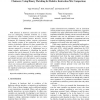Free Online Productivity Tools
i2Speak
i2Symbol
i2OCR
iTex2Img
iWeb2Print
iWeb2Shot
i2Type
iPdf2Split
iPdf2Merge
i2Bopomofo
i2Arabic
i2Style
i2Image
i2PDF
iLatex2Rtf
Sci2ools
IEEEPACT
2009
IEEE
2009
IEEE
Chainsaw: Using Binary Matching for Relative Instruction Mix Comparison
With advances in hardware, instruction set architectures are undergoing continual evolution. As a result, compilers are under constant pressure to adapt and take full advantage of available features. However, current techniques for evaluating relative compiler performance only compare profiles at the application level, ignoring relative performance differences at finer granularities. To ensure that new features are put to good use, a more rigorous approach is necessary. A fundamental step in tuning compiler performance is identifying the specific examples that can be improved. To solve this problem, we present a compiler-independent binary matching technique to compare executions of differently compiled programs and identify intervals where the behavior can be meaningfully compared. Matched intervals can be automatically analyzed to identify anomalous segments of execution where one version performs significantly differently versus another. We present case studies using Chainsaw t...
Compiler Performance | Hardware | IEEEPACT 2009 | Relative Compiler Performance | Relative Performance Differences |
| Added | 24 May 2010 |
| Updated | 24 May 2010 |
| Type | Conference |
| Year | 2009 |
| Where | IEEEPACT |
| Authors | Tipp Moseley, Dirk Grunwald, Ramesh Peri |
Comments (0)

